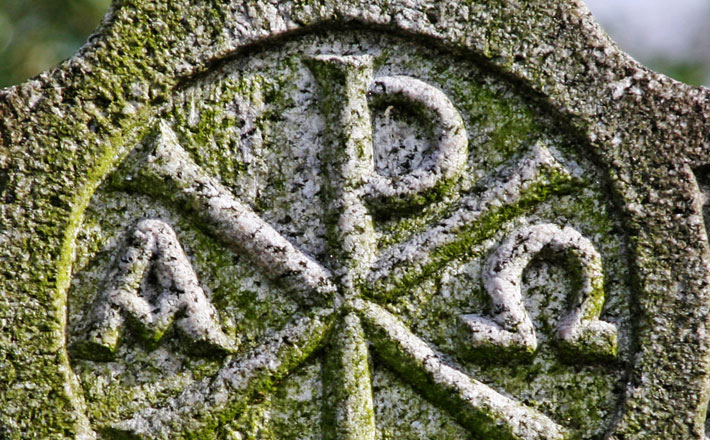Commentary on Acts 16:16-34
In last Sunday’s lesson, Paul met Lydia while he was looking for a place of prayer.
Now, again on his way to the place of prayer, Paul meets another woman. Whereas Lydia, while not necessarily wealthy, was at least a woman of some independence (as the head of her household), this second woman is doubly bound, a slave to a cartel of human masters, and a slave to the evil spirit that possesses her. She is a woman of no power, status, or freedom. Yet she speaks the truth about Paul and his partners, following them all around town and providing free advertising for Paul’s ministry.
But in the end, Paul cannot tolerate it any more. Perhaps even the truth, when proclaimed through abusive systems, ends up necessarily being distorted. Is her declaration that Paul and Silas offer “a way of salvation” (NRSV), rather than clearly saying “the way of salvation” (the Greek construction is ambiguous) such a distortion? Evil’s attempts to manipulate and perhaps control the truth are not to be tolerated, but answered with the clarity of the gospel.
And so, in Jesus’ name, Paul sets the woman free from the spirit that had occupied her life. At this point, we might wish to hear more about what happens to this woman, who remained a slave to her human owners. The focus of this scene is the power of Jesus over all the spirits of the world, but we might well ask whether and how there could be a more complete freedom for this woman. The story simply leaves her behind, nameless, disturbing, and perhaps a reminder of the continuing need of liberation for so many.
We might expect the people who witness this exorcism to react with awe, wonder, and even faith. Instead, there is greed, bigotry, and a hostile appeal to cultural-political identity that labels the “other” as different, and therefore as dangerous and a legitimate target of violence. It is not difficult to find similarly targeted groups among us: immigrant workers accused of taking “our” jobs, members of minority religious traditions who are seen as suspicious if not sinister, those whose sexual orientation or gender identity doesn’t fit the majority.
Too often, those who are perceived as different become the objects of criticism and violence in the name of being truly “American” or “Christian” (often with no distinction made between those two). Even more disturbingly, we may all find within ourselves a failure to recognize God at work in our midst, especially when that working of God upsets our plans and our profits.
It seems as though bigotry has won the day, with Paul and Silas locked in chains. The first sign that the powers of this world are really not in charge comes with the surprising songs in that dark cell. Paul and Silas sing praises to God — not laments for the suffering (which would be understandable, appropriate, and biblical) — but praise for the privilege of being God’s servants in the face of injustice.
God has already sprung preachers from Roman prisons twice in Acts (5:17-21, 12:6-11), so we readers shouldn’t be surprised that the Philippian jail can’t hold Paul and Silas. But the earthquake in this text is certainly a strange one as it is one that sets free instead of trapping and crushing. This earthquake is the visible manifestation of God shaking this world’s powers to their foundations.
Given the story of Peter’s rescue from prison in chapter 12, we might expect Paul and Silas to go immediately to Lydia’s house. But this is an escape story without an escape. Paul and Silas don’t leave. Being God’s servants does not mean escape from the dangerous places, but means the opportunity to be the voice and the hands of Christ there. And so just as Paul and Silas shared the gospel in song with their fellow prisoners (is that why all the other prisoners, whose chains and doors were also undone, stayed put with Paul and Silas?), now they save their jailer both from the suicide that Roman honor expected with a failure of duty (see 12:19), and from a life without faith in Christ.
Just as Lydia’s life was changed by the gospel, so too is the life of this jailer. He washes the wounds of Paul and Silas, and he becomes their host. The call to faith in verse 31 and the rejoicing over faith in verse 34b frame a scene in which we find the Word of the Lord being spoken (32), service to others (33a), baptism (33b), and sharing a meal (34a). This is a picture of the church’s life, which the jailer has now entered by faith.
The next morning, the city magistrates want to be done with this episode quickly. Perhaps they realize that the mob mentality had gotten out of hand the previous day; perhaps they hoped that a single night in prison would be enough to stop any more troublemaking from Paul and Silas. Despite the events of the previous night, the magistrates think they’re still in control of their little part of the world.
But they, and we readers, are in for one more surprise, as Paul reveals his Roman citizenship for the first time. With that one declaration, the magistrates’ sense of power and control is taken away. Like those Gerasenes in Luke 8 who could not tolerate Jesus’ exorcism (or was it losing all those pigs that they couldn’t tolerate?), so now the leaders of Philippi beg Paul to simply leave them alone. Paul does go; after all, God is calling him to an expanding mission.
But before he goes, we hear in verse 40 a reminder that the church is still there in Philippi in the house of Lydia (and, we remember, in the house of the jailer). If the magistrates felt any relief at Paul’s departure, it was premature and mistaken. The church remains, serving and proclaiming the risen Jesus as Lord, and the world will not go back to the way it was.


May 12, 2013